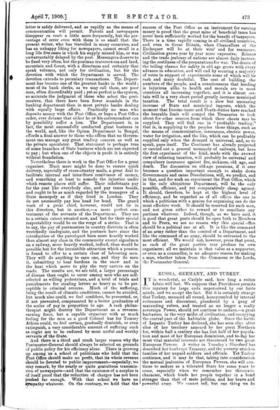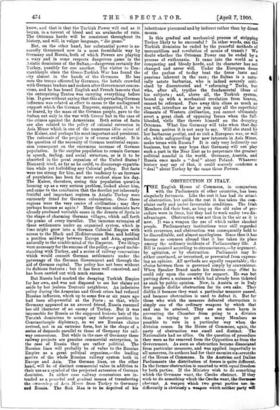RUSSIA, GERMANY, AND TURKEY.
IT is wonderful, as Carlyle said, how long a rotten fabric will last. We suppose that Providence permits this mystery for large ends unperceived by our finite minds, and we accept the fact. But it is certainly strange that Turkey, menaced all round, honeycombed by internal rottenness and discontent, plundered by a, gang of marauding rulers, and treated as no longer a really sovereign Power, should yet continue to endure,—a great barbarism in the very midst of civilisation, and occupying the central part of the habitable globe. Since the battle of Lepanto Turkey has declined, she has seen slice after slice of her territory annexed by her great Northern foe, within half a century she has lost half of her popula. tion and-most of her European dominions, and to-day her most vital material interests are threatened by two great European Powers. A writer in Tuesday's Standard has described her bankrupt Treasury, and the poverty-stricken families of her unpaid soldiers and officials. Yet Turkey continues, and it may be that, taking into consideration the mutual jealousies of European Powers, she will con- tinue to endure as a, tolerated State for some years to come, especially when we remember her theocratic character, which binds her people together in a bond stronger than that of mere politics, and her brave and powerful army. We cannot tell, but one thing we do know, and that is that the Turkish Power will end as it begun, in a torrent of blood and an avalanche of ruin. The Ottoman horde will be consistent throughout its history, and will, in vulgar language, " die game."
But, on the other hand, her substantial power is as- suredly threatened now in a most formidable way by Germany and Russia, both of which Powers are playing a wary and in some respects dangerous game in the .1siatic dominions of the Sultan,—dangerous certainly for Turkey, possibly for one another. The visitor to Con- stantinople since the Greco-Turkish War has found the city almost in the hands of the Germans. He has seen the troops officered by Germans, the hotels crowded with German traders and seekers after Government conces- sions, and he has heard English and French laments that the enterprising Teuton was carrying everything before him. It goes without saying that this all-pervading German influence was related as, effect to cause to the undisguised support which the German Emperor, supported, it is to be feared, by the mass of the German people, gave to the Sultan not only in the war with Greece but in the case of the crimes against the Armenians. Both series of facts are also related to the policy of colonial extension in Asia Minor which is one of the numerous idees ozeres of the Kaiser, and perhaps his most important and persistent. The rationale of the project is of course evident. It is the question of the necessity of German territorial expan- sion consequent on the enormous increase of German population. Is the surplus population to remain German in speech, feeling, and social structure, or is it to be absorbed in the great organism of the United States ? Bismarck tried, as far as he could, to discourage expatria- tion while yet forbidding any Colonial policy. But facts were too strong for him, and the tendency to an increase of population has been far more evident since his day. The Kaiser, therefore, seeing this population question looming up as a very serious problem, looked about him, and came to the conclusion that the derelict yet inherently fruitful and important regions in Asiatic Turkey were eminently fitted for German colonisation. Once these regions were the very centre of civilisation ; may they perhaps become so again ? Many German colonists have already produced veritable oases in the deserts of Syria in the shape of charming German villages, which call forth the praise of every traveller. The immense extension of these settlements under an organised system, which in time might grow into a German Colonial Empire with access to the Black and Mediterranean Seas, and holding a position midway between Europe and Asia, appealed naturally to the nimble mind of the Emperor. Two things were necessary for the success of the policy,—a good under- standing with Turkey, and a series of railway concessions which would connect German settlements under the patronage of the German Government and through the aid of German capital. The policy has not been without its dubious features ; but it has been well conceived, and has been carried out with much success.
But Russia had marked the decaying Turkish Empire for her own, and was not disposed to see her claims set aside by her jealous Teutonic neighbour. An indecisive policy during the Armenian and Greek crises had reduced Russian influence, which up to some five or six years ago had been all-powerful at the Porte ; so that, while Germany appeared as an avowed friend, Russia resumed her old character of an enemy of Turkey. But it was impossible for Russia as the supposed historic heir of the Turaish dominions to accept any inferior position in Constantinople diplomacy, so we see Russian claims revived, not in an extreme form, but in the shape of a series of demands parallel to those of Germany for rail- way concessions. But while in the case of Germany these railway projects are genuine commercial enterprises, in the case of Russia they are rather political. The Russian lines will probably be of value to the Russian Empire as a great political organism,—the leading motive of the whole Russian railway system both in Europe and Asia. The German lines, on the other hand, will be of distinct commercial value in addition to their use as a symbol of the projected extension of German dominion. In either case railway concessions are in- tended as a peaceful and gradual means of transferring the ownership of Asia Minor from Turkey to Germany and Russia. The Sick Man is to be deprived of his inheritance piecemeal and by indirect rather than by direct means.
Is this gradual and mechanical process of stripping Turkey likely to be successful ? In other words, can the Turkish dominion be ended by the peaceful methods of mercantilism and revolution of means of transit ? We doubt whether the Ottoman Power can be ended by a process of euthanasia. It came into the world as a conquering and bloody horde, and its character has not changed and never will. Under the European dress of the pashas of to-day beat the fierce lusts and passions inherent in the race ; the Sultan is a natu- rally astute barbarian, who is indeed severely criti- cised by discontented and " reforming " Turks, but who, after all, typifies the fundamental ideas of his subjects ; and, above all, the Turkish system, bound up with a mechanical revelation from heaven, cannot be reformed. Pare away thin slices as much as you will, introduce as far as you may all the superficial elements of Western civilisation, you cannot ultimately avert a great clash of opposing forces when the full- blooded, virile Slav throws himself on the decaying Ottoman. What line Germany will take when that day of doom arrives it is not easy to say. Will she stand by her barbarous protege, and so risk a European war, or will she, while safeguarding her new interests in Asia Minor, make terms with Russia ? It is only very indirectly our business, but we may hope that Germany will not play such a part in the Near East as to perpetuate the greatest political scandal in the world. Germany, Austria, and Russia once made a " deal " about Poland. Whatever history may say of that, it could scarcely condemn a " deal " about Turkey by the same three Powers.







































 Previous page
Previous page